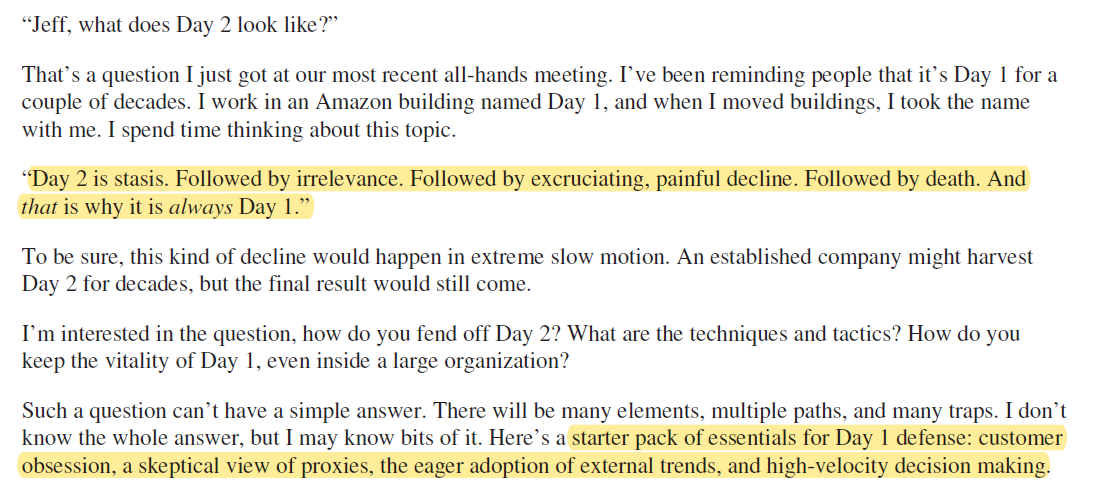Jeff Bezos to the World: Lessons From Amazon's Annual Letters to Shareholders
Here are some things I picked out from Amazon's shareholder letters when Jeff Bezos was boss.

In the world of business, few figures loom as large as Jeff Bezos, founder and long-time ex-CEO of Amazon.
His annual letters to shareholders have become a masterclass in leadership, innovation, and long-term thinking.
Let’s delve into these letters, spanning from 1997 to 2020, and uncover six key lessons that hold wisdom not just for investors but for anyone seeking to build something meaningful.
(Bonus: You can download the full notes that I have compiled from reading every single Amazon shareholder letter by Jeff Bezos here.)
1. Long-Term Thinking: The Bedrock of Enduring Success (1997)
In his very first letter, Bezos laid out a manifesto: "It's All About the Long Term."
He emphasised that Amazon would prioritize long-term value creation over short-term gains, even if it meant enduring market misunderstanding. This commitment to the long game became a cornerstone of Amazon's culture.
Bezos' message was clear: Building a lasting enterprise requires patience, a relentless focus on customers, and an unwavering will to invest in the future.
It's a reminder that focusing on enduring value, rather than chasing quick wins, leads to more sustainable and impactful outcomes.
2. Focus on the Business, Not Just the Stock Price (2000)
In the 2000 letter, Bezos wrote that Amazon shares were down 80% then. He went on to address the importance of focusing on the fundamentals of the business rather than being overly swayed by stock market fluctuations.
He emphasised that building a great company with strong customer relationships and a healthy financial foundation would ultimately translate into long-term shareholder value.
Quoting Warren Buffett’s mentor, Benjamin Graham, Bezos pointed to the fact that while external factors may influence the stock price, it's the strength of the underlying business that ultimately determines its true worth.
3. Obsess Over Customers, Not Competitors (2012)
Bezos' customer-centric philosophy has been a defining characteristic of Amazon's success.
In his 2012 letter, he reiterated that the company's growth stemmed from focusing relentlessly on customer needs, not on trying to outmanoeuvre competitors.
He encouraged a proactive approach to innovation, anticipating customer desires and going beyond simply reacting to what rivals were doing.
This lesson reminds us that as an entrepreneur, putting the customer at the heart of everything – from product development to customer service – fosters loyalty, drives innovation, and ultimately leads to sustainable growth. It's about creating value for the customer, not just competing for their attention.
4. Decision-Making: Type 1 vs. Type 2 (2015)
Bezos famously categorised decisions into two types: Type 1 and Type 2.
Type 1 decisions are consequential and irreversible/nearly irreversible (one-way doors), while Type 2 decisions are less critical and easily reversible (two-way doors). Most decisions fall into the Type 2 category.
Some examples of Type 2 decisions: Should I take that career risk? Should I take up that promotion? Should I move to another country?
He advocated for making high-quality Type 1 decisions deliberately and cautiously, while empowering teams to quickly experiment with Type 2 decisions.
Even if you’ve made a “suboptimal Type 2 decision, you don’t have to live with the consequences for that long” as you can reopen the door and walk back.
This framework provides a practical approach to navigating the complexities of decision-making, even as individuals. It encourages thoughtful consideration for important choices while fostering a culture of experimentation and learning from less critical decisions.
5. The Right Amount of Information (2016)
Bezos constantly emphasised that it’s always Day 1 at Amazon. What does it mean? The definition of Day 2 from the 2016 letter below sums it up well.
Adding on to the previous point about how most decisions are two-way doors, Bezos talked about his approach to high-velocity decision making. He said that it's impossible to have complete information before making a decision.
Instead, he advocated for gathering 70% of the desired information and then making a judgment call.
If you wait for 90%, you are probably too slow in most cases. And since most decisions can be reversed if they are proven wrong, it makes it more important to act quickly and learn from mistakes than to wait for perfect information.
Lesson here? Have a bias towards action and be willing to course-correct. It's a reminder that progress often comes from taking calculated risks and adapting as you go, rather than waiting for certainty that may never arrive.
6. Embrace the Beginner's Mind (2018)
In his 2018 letter, Bezos stressed the value of approaching things with a beginner's mind, unburdened by preconceived notions or past successes.
This lesson encourages a culture of continuous learning and adaptability. It reminds us that staying curious, embracing new ideas, and the willingness to be guided by our inner voice are essential for growth.
A Treasure Trove of Wisdom
Jeff Bezos' annual letters to shareholders offer a treasure trove of insights for investors, entrepreneurs, and anyone seeking to have a better life.
The lessons of long-term thinking, decision-making frameworks, a bias towards action, and the importance of trusting your intuition go beyond the business world. They provide a roadmap for navigating uncertainty, embracing change, and creating a legacy that stands the test of time.
(Another reminder that you can download the full notes that I have compiled from reading every single Amazon shareholder letter by Jeff Bezos here.)




